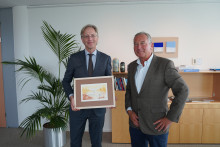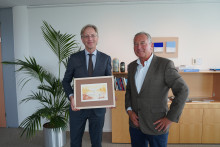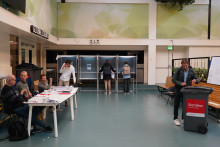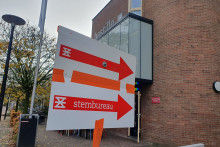Marcel Levi, chair of the Dutch Research Council, would never have bet on the PVV becoming the biggest the party. ‘If they are going to form a coalition with VVD and NSC, we have to make sure we get the message across that knowledge and innovation are crucial for the country, for society and for the economy. Because there are some misunderstandings about that.’
It may be a little early in the day, but Levi is willing to give his reaction to the election result, which could have major implications for scientific research.
Levi would like to explain to politicians the difference between migrant workers and highly-skilled migrants, he says. In his role as NWO chair he has no views on migrant workers, but he certainly has an opinion on highly-skilled migrants. ‘They are also hugely important for companies, so if you value the economy, you have to take that into account.’
He also believes that universities need researchers and lecturers from abroad. Besides heading the NWO, Levi is also chair of the Knowledge Coalition, which brings together knowledge institutions and the business community to emphasise the importance of education, research and innovation.
Dialogue
He believes there is room for dialogue. ‘Omtzigt is a smart guy, so he will understand’, expects Levi. ‘Election campaigns are often dominated by one-liners and oversimplification of issues. It’s much too complicated to say: I want these migrants, but I don’t want those. But I’m still optimistic that there is a real willingness on the part of the parties to recognise the importance of people who boost knowledge and innovation here. The facts speak for themselves.’
He also believes that there is room for debate about the large intake of international students and the importance of English-taught programmes. ‘International students should absolutely be welcome at technical universities; banning them would be an act of self-harm for the country. But I do wonder why we offer psychology degree programmes in English. What use is that to the Netherlands? That’s a good discussion to have. But you have to look at it sector by sector: do English-taught programmes add value to the country, yes or no? Simply saying, ‘We don’t want foreign students’ isn’t going to help.’
And what about the impending cuts? Scrapping funding for nationwide collaborations within scientific disciplines – something the VVD has been pushing for – will be difficult, he says. ‘For these sector plans, God knows how many people have just been given a permanent contract. Where does that leave them? It’s a bit difficult to just pull the plug on all that.’
Wait and see
From diversity policies to climate research, the impact of the elections remains to be seen, but Levi believes it is a matter of calmly explaining why it is important. And a coalition agreement is still a long way off. ‘We don’t yet know who will come to power. We only know who will try to form a government first’, stresses Levi. ‘So let’s just wait and see.’







